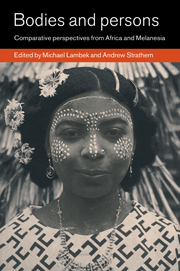Book contents
- Frontmatter
- Contents
- List of illustrations
- List of contributors
- Acknowledgments
- 1 Introduction: Embodying sociality: Africanist–Melanesianist comparisons
- Part I Transcending dichotomies
- 2 “It's a boy,” “it's a girl!” Reflections on sex and gender in Madagascar and beyond
- 3 Modernity and forms of personhood in Melanesia
- 4 Refiguring the person: the dynamics of affects and symbols in an African spirit possession cult
- 5 Body and mind in mind, body and mind in body: some anthropological interventions in a long conversation
- Part II Transitions, containments, decontainments
- Part III From exchange to history
- Bibliography
- Index
2 - “It's a boy,” “it's a girl!” Reflections on sex and gender in Madagascar and beyond
Published online by Cambridge University Press: 05 June 2012
- Frontmatter
- Contents
- List of illustrations
- List of contributors
- Acknowledgments
- 1 Introduction: Embodying sociality: Africanist–Melanesianist comparisons
- Part I Transcending dichotomies
- 2 “It's a boy,” “it's a girl!” Reflections on sex and gender in Madagascar and beyond
- 3 Modernity and forms of personhood in Melanesia
- 4 Refiguring the person: the dynamics of affects and symbols in an African spirit possession cult
- 5 Body and mind in mind, body and mind in body: some anthropological interventions in a long conversation
- Part II Transitions, containments, decontainments
- Part III From exchange to history
- Bibliography
- Index
Summary
The reflections on sex and gender presented in this chapter were set in motion by the experience of giving birth to my son four years ago in London. Under the influence of the National Birth Association, I was determined to have a “natural birth,” free of any unnecessary medical intervention. Accordingly, one of my requests was that the midwife should refrain from telling me the sex of my baby, for I wanted to be allowed to register it “in my own time,” and to decide for myself whether the fact that the newborn was male or female should be of any relevance at all. At the time, I imagined that my Vezo friends in Madagascar, unlike some of my British and Italian friends at home, would have no difficulty in understanding why I did not want the sex of my baby to be the first thing to be uttered about him or her, only seconds after the birth. I thought they would understand my attempts to escape the strictures of the dominant “gender system of the west” (as in Errington 1990), in which a person, from the very beginning, cannot be anything at all if it is not sexed.
I thought they would understand because the Vezo with whom I had lived and worked for almost two years had impressed me for their lack of interest in the difference between people with male and female genitals – a difference which, in many contexts, appeared to make very little difference (Astuti 1993).
- Type
- Chapter
- Information
- Bodies and PersonsComparative Perspectives from Africa and Melanesia, pp. 29 - 52Publisher: Cambridge University PressPrint publication year: 1998
- 17
- Cited by

